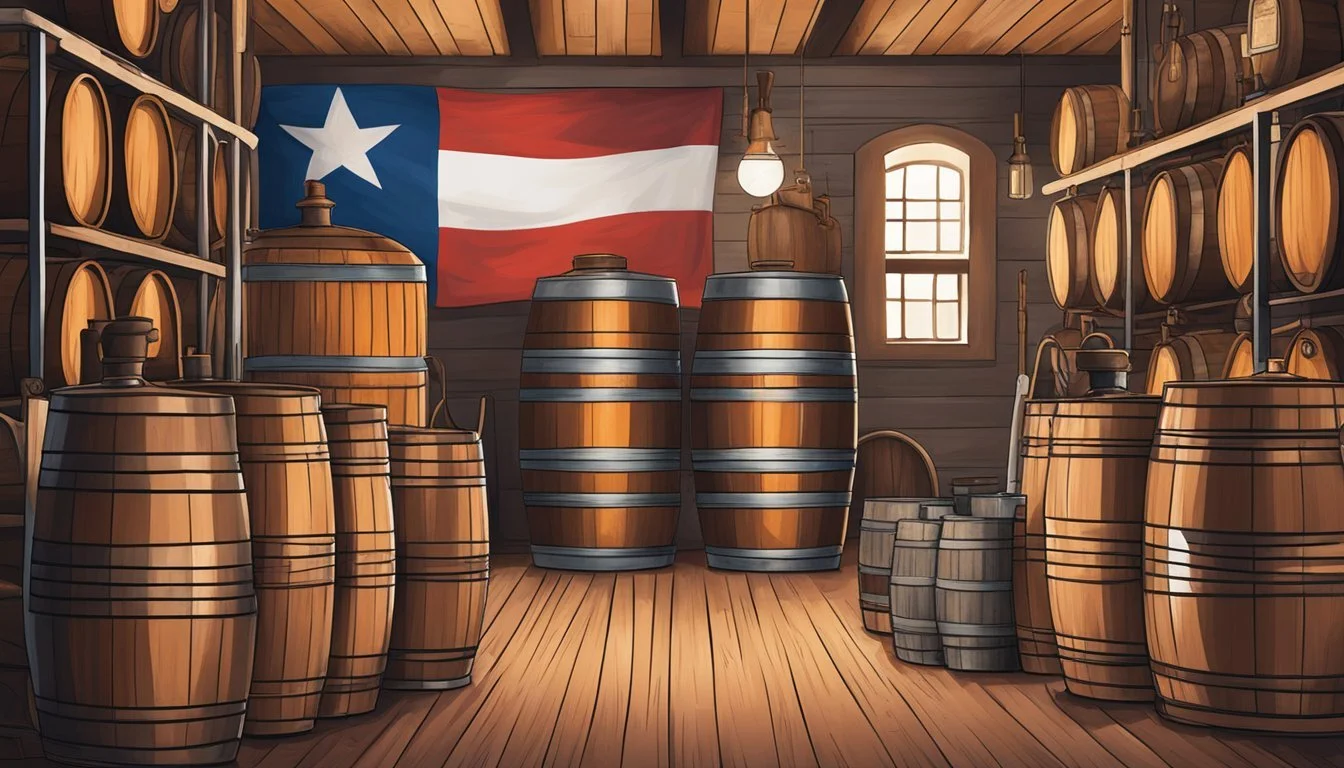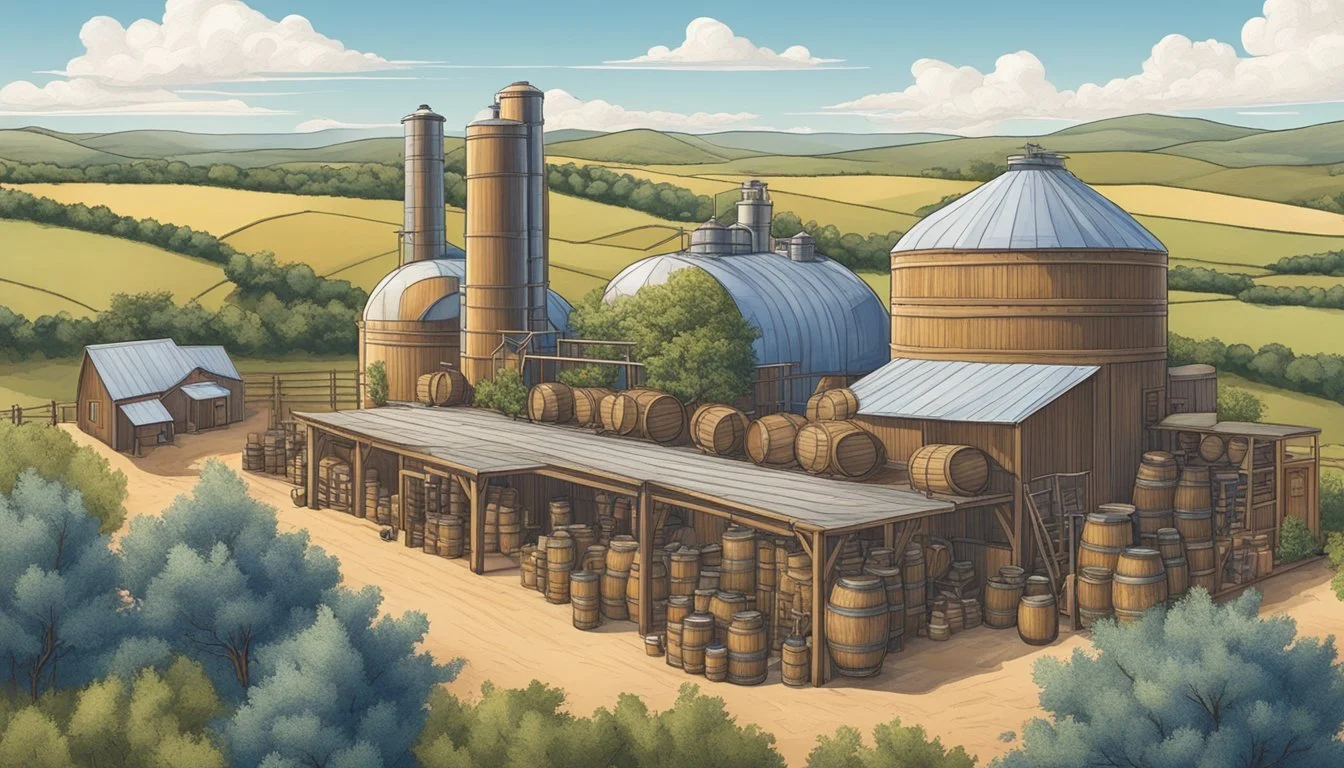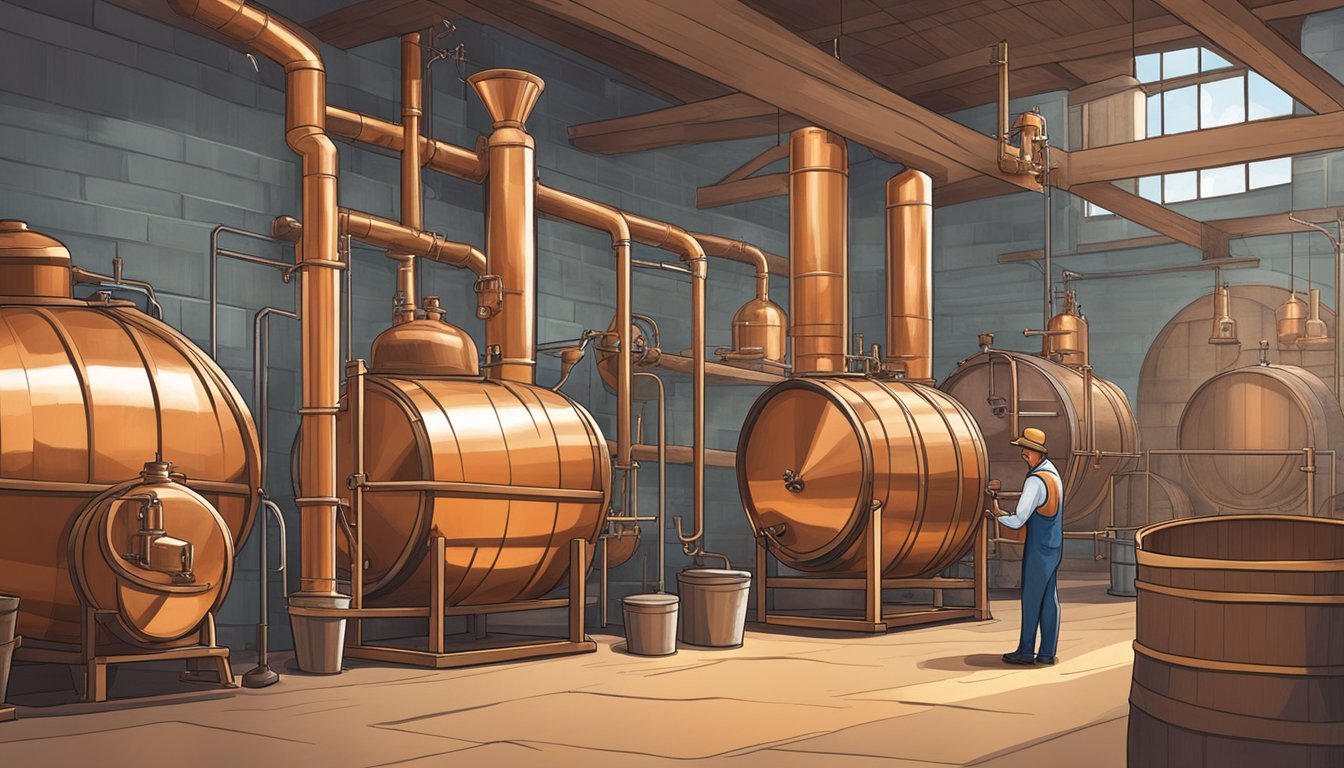The Rise of Texas Gin Distilleries
Crafting a Lone Star Legacy
The landscape of American spirits is ever-evolving, and the state of Texas has emerged as a noteworthy player in the gin distillation scene. Historically overshadowed by Kentucky's bourbon and Tennessee's whiskey, Texas is carving out its own niche with a burgeoning gin industry. Distilleries across the Lone Star State have embraced the challenge, producing a diverse array of gins that capture the unique flavors and spirited essence of Texas.
Drawing from Texas's rich botanical offerings, local distillers have crafted gins that stand apart from traditional profiles. Ingredients like local juniper, citrus, and wildflowers infuse these spirits with distinct regional character. Distilleries such as Treaty Oak with its Waterloo No. 9 and Still Austin Whiskey Co. exemplify the innovation and craftsmanship driving this growth. These trailblazers and others like them are not just making gin—they are redefining it with a clear vision grounded in the terroir of Texas.
From the Hill Country to the bustling cities, the Texas gin movement reflects a harmony of tradition and creativity. These distilleries are not just producing spirits; they're telling the story of Texas through every bottle. As they harness sustainable practices and locally sourced ingredients, they're ensuring that Texas gin is more than just a trend—it's a testament to the state's spirit of innovation and the evolution of American distilling.
History and Evolution of Texas Distilleries
The history of Texas distilleries is marked by a tumultuous past shaped by Prohibition, followed by a resurgence with the rise of craft distilling and evolving legal frameworks that have guided the industry's expansion.
The Impact of Prohibition
During Prohibition (1920-1933), the production, sale, and transport of alcoholic beverages were illegal across the United States, which included Texas. This led to the shuttering of legal distilleries and the rise of illicit operations. The era put a halt on the legal production of Texas Bourbon and American Whiskey in the state, suppressing the industry's growth and leaving a void that would take decades to fill.
Rise of Craft Distilleries Post-Prohibition
Post-Prohibition, the Texas distillery industry remained subdued for years, largely due to lingering regulatory hurdles and societal attitudes. However, the late 20th and early 21st centuries saw a dramatic shift. Small-scale craft distilleries began to emerge, signifying a new chapter for Texas spirits. Brands like Garrison Brothers, established post-2000s, spearheaded the new wave of Texas Whiskey, hinting at the state's potential to produce high-quality American Whiskey and bourbons.
Legal Landscape and Regulatory Changes
The craft distillery movement in Texas further gained momentum due to key regulatory changes. Before these changes, strict laws surrounding distilling and sales were in place. Recent legal modifications have allowed for more flexibility and growth, enabling craft distilleries to thrive. The industry has seen an uptick in the production of distinctive gins, expanding the reputation of Texas beyond just whiskey, and making room for Texas distilleries to innovate and refine their offerings.
Texas Gin Distillery Profiles
In a burgeoning scene marked by craftsmanship and unique regional flavors, the following Texas distilleries are leading the way in producing distinct gins with a true Lone Star State character. They showcase innovative distillation processes and utilize local botanicals to create craft spirits that resonate with the essence of Texas.
Treaty Oak Distilling: Pioneering the Spirit
Treaty Oak Distilling has been at the forefront of Texas's craft spirits movement. Known for their flagship No. 9 gin infused with Texas-based botanicals such as lavender, pecans, and grapefruit, they exemplify a commitment to local flavors. They also offer a sweeter version, the Old Yaupon Gin, adhering to an Old Tom style.
Revolution Spirits: Innovation in Production
At Revolution Spirits, innovation is key. Though not extensively detailed in the provided information, they have made a name in the Texas gin market. Their craft gins are a result of a creative distillation process that embraces both traditional and modern techniques to develop truly unique spirits.
Still Austin Whiskey Co: Blending Tradition and Modernity
Still Austin Whiskey Co., while primarily recognized for whiskey, has contributed to a diverse range of spirits. Based in Austin, this distillery melds tradition with modern methods, preparing spirits that are deeply connected to Texas culture and sustainable practices, thereby cementing its place in the state's craft distillery map.
Desert Door Distillery: Harnessing Native Botanicals
Desert Door Distillery differentiates itself by utilizing native Texas botanicals, embodying the wild spirit of the state. Their spirits are a journey through Texas's landscapes, offering a sip of the area's diverse flora and inherent boldness in each bottle of distilled gin.
Gin Distillation and Production
The intricate process of creating gin involves a delicate balance of botanicals and expert distillation methods. Texas distilleries have honed these techniques to yield an array of unique and refined spirits.
The Role of Botanicals in Gin Craftsmanship
Botanicals are the essence of gin's character. Juniper berries, the primary botanical, imbue gin with its distinctive pine-like flavor. Texas distilleries often incorporate local flora to distinguish their gin, using ingredients such as Texas grapefruit or local herbs to add a regional twist. In Texas, the botanical mix is chosen to reflect the spirit of the locale, giving each gin a signature profile.
Distillation Techniques and Equipment
Distillation transforms the neutral spirit and botanicals into gin. Texas craft distillers employ various types of stills, from traditional copper pot stills to column and vacuum distillation systems. The latter, a modern technique mentioned in the search results, allows distillation at lower temperatures, preserving the delicate nuances of the botanicals. Each distillery chooses its method based on the desired end product, with some Texas makers experimenting with innovative strategies to push the boundaries of traditional gin production.
Aging and Maturation: Texas's Unique Approach
While not all gins undergo aging, Texas distillers are exploring its potential. Unlike the clear gins commonly seen, aged gins take on color and complexity from time spent in barrels. Texas's variable climate influences the aging process, potentially accelerating maturation and infusing the gin with distinct regional nuances. This experimentation with aging showcases a departure from convention and an embrace of local character.
Varieties of Texas Gin
Texas distilleries are producing an impressive array of gins, with a focus on local flavors and innovative twists on traditional types.
Rye Gin: A Texan Twist on the Classic
Texas distillers are crafting Rye Gin, infusing the peppery and slightly fruity notes of rye grain into the gin's base. This combination brings a unique warmth and complexity to the spirit that sets it apart from the classic gin profile.
London Dry Gin from Texas
Texas has put its own stamp on the London Dry Gin variety. Distillers in the Lone Star State are following the time-honored traditions of this classic style while often incorporating local botanicals to give it a Texas flare.
Signature Texas Gins with Unique Botanical Blends
The hallmark of Texas gins is their signature botanical blends. Waterloo No. 9 Gin, for instance, is a prime example of a Texas gin featuring local elements like lavender, pecan, and grapefruit. Texas distilleries place a significant emphasis on hand-selected, high-quality ingredients, presenting gins that are as diverse and dynamic as the state itself.
Exploring the Texas Gin Experience
As the Texas gin industry flourishes, aficionados can immerse themselves in a world where local flavors meet innovative distilling methods. Through on-site tasting rooms and curated tours, one can explore the essence of Texas distilled into every bottle, while gin-based cocktails and culinary pairings showcase the versatility of this spirited beverage.
Tasting Rooms and Tours
Tasting Rooms in Texas offer an up-close look at the craft behind gin production. For example, visitors to Real Spirits Distilling Co. in Blanco can witness the grain-to-glass process that encapsulates the spirit of the Hill Country. Their address is 281 San Saba Ct, Blanco, TX 78606, and they can be contacted at +1 830-833-2534.
Still Austin Whiskey Co. in Austin, found at 440 St. Elmo Rd E, Austin, TX 78745 (Phone: (512) 276-2700), not only specializes in whiskey but also provides insights into their operation, emphasizing sustainable practices that could also apply to gin production.
Guided tours enlighten visitors on the intricacies of distilling and the particular botanicals that give Texas gin its unique character. The first Texas gin on the market, Waterloo No. 9 Gin, hails from Treaty Oak, which inspired a wave of Texas gin production and set a high standard for others to follow.
Gin-Based Cocktails and Culinary Pairings
Texas gin distilleries excel in creating cocktails that complement the characteristic notes of their gins. These range from classic gin & tonics to more adventurous concoctions that highlight the boldness of Texas flavors. The richness of barbecue or the subtle sweetness of a cafecito can be enhanced when paired thoughtfully with the right Texas gin.
Craft Gin Cocktails: Distilleries often provide menus of signature drinks that may include local ingredients, like Hill Country herbs or citrus, integrating them into gin-based cocktails that tell a story of the region.
Culinary Pairings: Savvy distillers and local chefs alike recommend pairing Texas gin with regional cuisines, particularly smoked meats (What wine goes well with smoked meats?), to balance the robust flavors of both.
edList of Distilleries and their offerings:
Distillery Name Address Signature Cocktails Food Pairing Suggestion
Real Spirits Distilling Co. 281 San Saba Ct, Blanco, TX 78606 Hill Country Herbal Martini Barbecue Sliders
Still Austin Whiskey Co. 440 St. Elmo Rd E, Austin, TX 78745 South Austin Caipirinha Brisket Tacos
These elements come together to provide a Texas gin experience that is as authentic as it is delightful, engaging all the senses with every sip and bite.
The Business of Gin in Texas
The Texas gin market is characterized by the state’s robust spirit for innovation and a growing consumer appetite for locally produced, craft spirits. Distilleries have been tapping into regional flavors and preferences, pivoting from traditional spirits such as craft beer and vodka to embrace the intricacies of gin production.
Market Trends and Consumer Preferences
The Texas gin scene has seen a notable rise in interest, with consumers increasingly leaning towards locally-made, small-batch gins. This shift mirrors the broader national trend where craft spirits are gaining market share over mass-produced alternatives. Distilleries like Treaty Oak and Still Austin Whiskey Co. are capitalizing on this trend by incorporating local ingredients and distinctive Texan flavors into their gin, setting them apart from traditional European-style gins.
Market Trends:
Localism: A craving for regionally produced spirits
Craft Distilling: Growing appreciation for artisanal production methods
Flavor Innovation: Excitement around unique botanical mixtures
Consumer Preferences:
Authenticity: Desire for spirits with provenance and story
Uniqueness: Interest in unusual and bold flavor profiles
Challenges and Opportunities for Texas Distilleries
Challenges for Texas distilleries include navigating stringent regulations and competing with established national and international brands. The necessity to balance tradition with innovation is key to remaining competitive and appealing to a discerning clientele. Distilleries also face the logistical hurdle of sourcing quality ingredients and maintaining a consistent supply chain.
Opportunities abound in the form of consumer education and engagement. As tastes evolve, there is an opening for Texas gin makers to educate the public about the complexity and versatility of gin, which can encourage a deeper appreciation and drive loyalty. Collaboration with local breweries and vodka producers can also pave the way for creative blend techniques and cross-promotion, utilizing the already-established market presence of craft beer and vodka industries to bolster gin’s standing.
Business Growth:
Collaboration: Bonding with craft beer and vodka businesses for mutual growth
Education: Offering tastings and workshops to build a knowledgeable consumer base
By addressing the challenges and seizing the opportunities, Texas distilleries can strengthen their position in a competitive market while pushing the frontier of what gin can be.
Texas Gin in Culture and Community
The Texas gin scene has blossomed into a symbol of local craftsmanship and community spirit, taking a prominent place in cultural events and exhibiting a commitment to sustainability.
Local Events and Festivals
Texas boasts a rich tradition of craft distilleries participating in local events and festivals, where they showcase their gins and share their expertise. Treaty Oak and Still Austin Whiskey Co. are examples of distilleries that have become staples at these gatherings, giving visitors a taste of the unique Texas flavor profile in their spirits. Events such as tastings and gin-inspired social gatherings not only provide exposure for these local gins but also foster a sense of community among spirit enthusiasts.
Sustainability and Community Involvement
Many Texas gin distilleries place a high value on sustainability and actively involve themselves in community initiatives. Distilleries like Real Spirits Distilling Co. emphasize a grain-to-glass ethos, reflecting Texas' agricultural heritage and commitment to the local economy. By using locally sourced botanicals and materials, these distilleries minimize their environmental footprint while supporting other local businesses. This approach to production resonates with a growing consumer base that values both the origin and sustainability of what they consume.
Future of Texas Gin Industry
The Texas gin industry is poised for dynamic growth, marked by a strong inclination towards innovation and the integration of advanced distilling technologies. As craft spirits continue to rise in popularity, Texas distilleries are harnessing these industry changes to shape their future.
Innovation and Experimentation
Distillers in Texas are not just sticking to traditional gin recipes, but are infusing local flora and experimenting with unique grain-to-glass processes. Treaty Oak Distilling has already set a precedent with their Waterloo No. 9 Gin, which incorporates local Texan ingredients. This trend of local botanicals personalizing gin flavors is a sign of the state's commitment to homegrown innovation. Small batch productions allow for a greater range of experimentation, aligning with the consumer's growing appetite for unique craft spirits.
The Role of Technology in Distilling
Advancements in technology are streamlining the distillation process, making it more efficient and consistent. The Still Austin Whiskey Co. demonstrates this with their meticulous in-house grain milling and fermentation processes. Distilleries are increasingly leveraging technology to control every aspect of gin production, yielding distinct flavors and higher-quality spirits. Utilizing technology not only improves the distillation process but also plays a crucial role in maintaining sustainability, a key concern moving forward in the industry.









